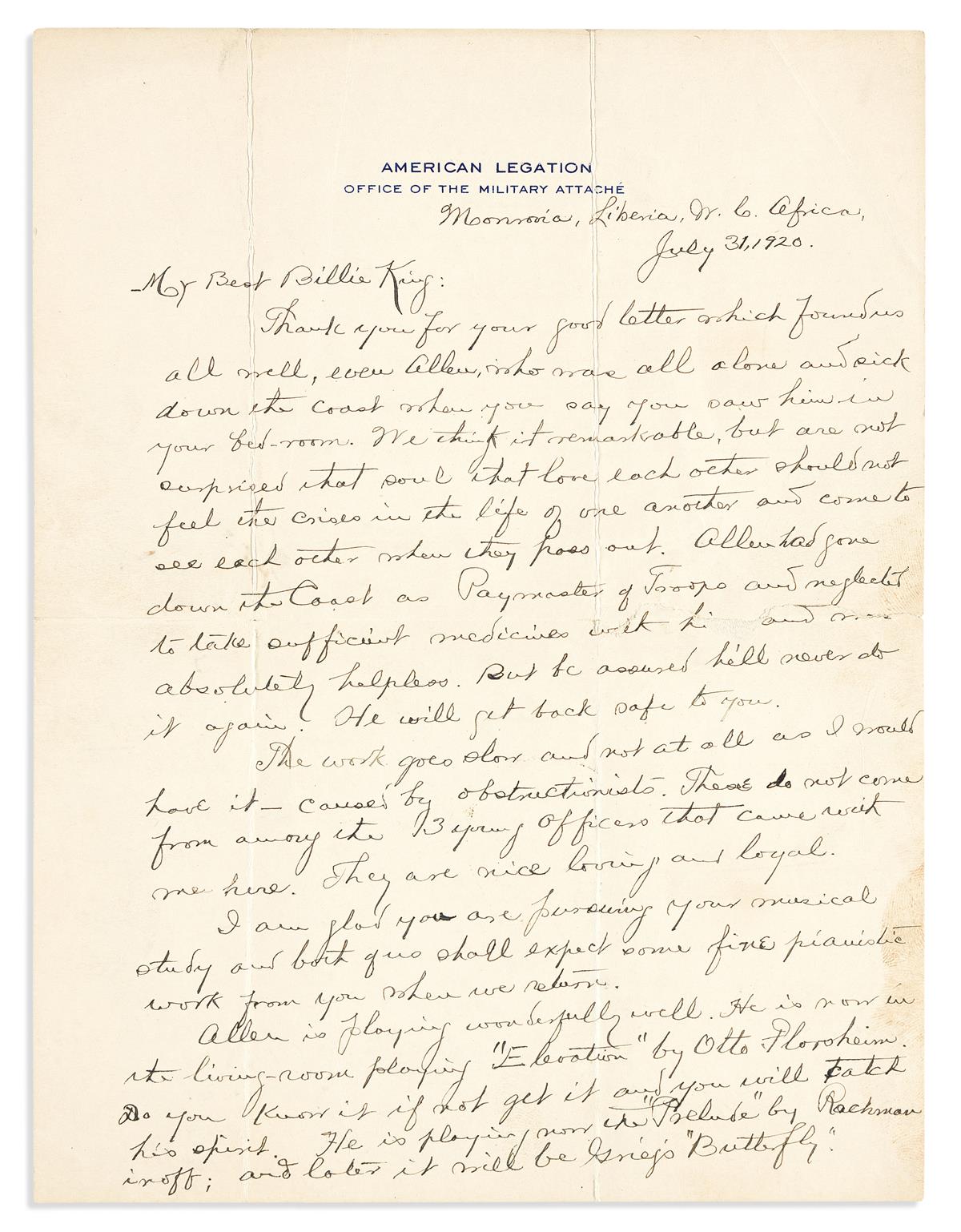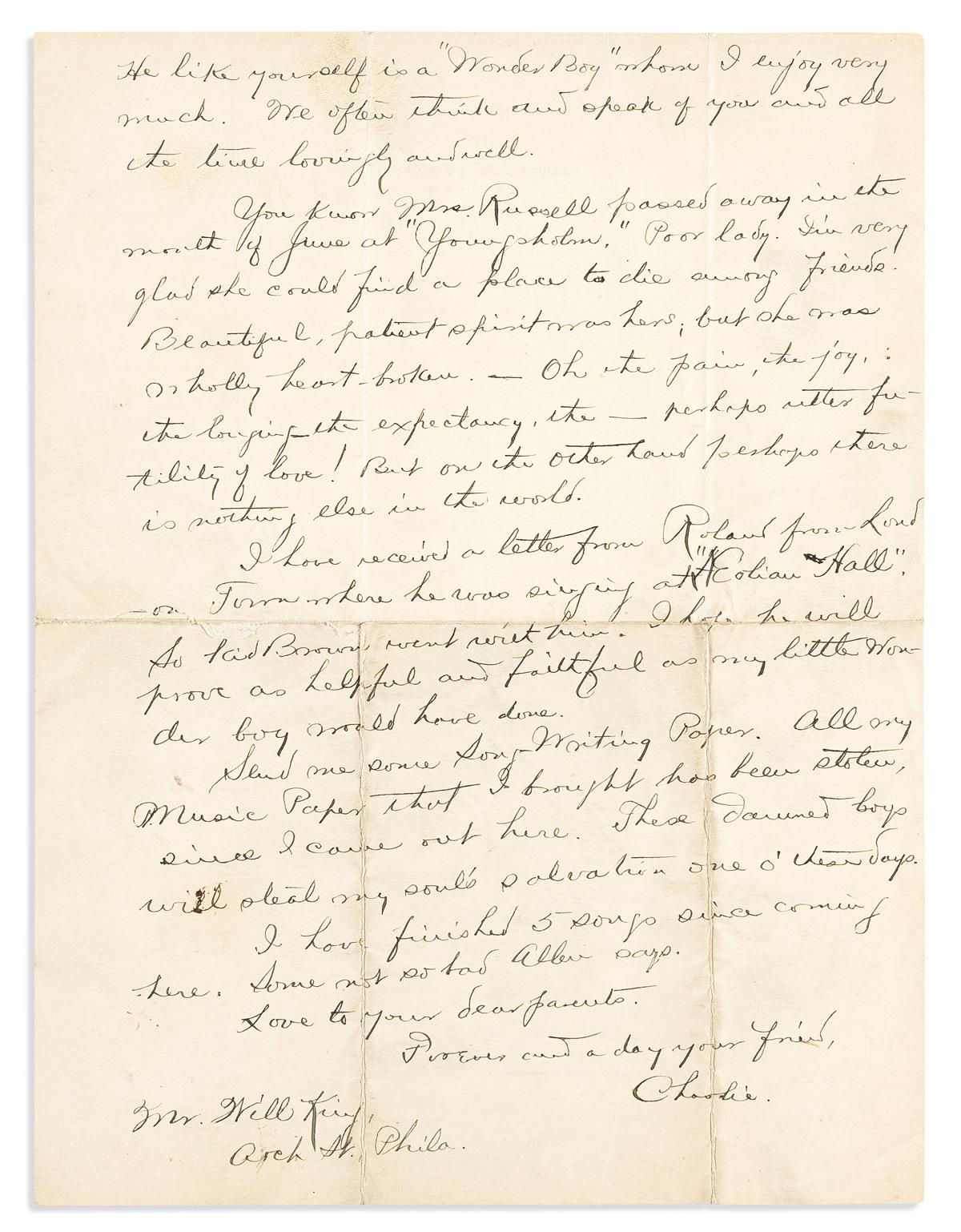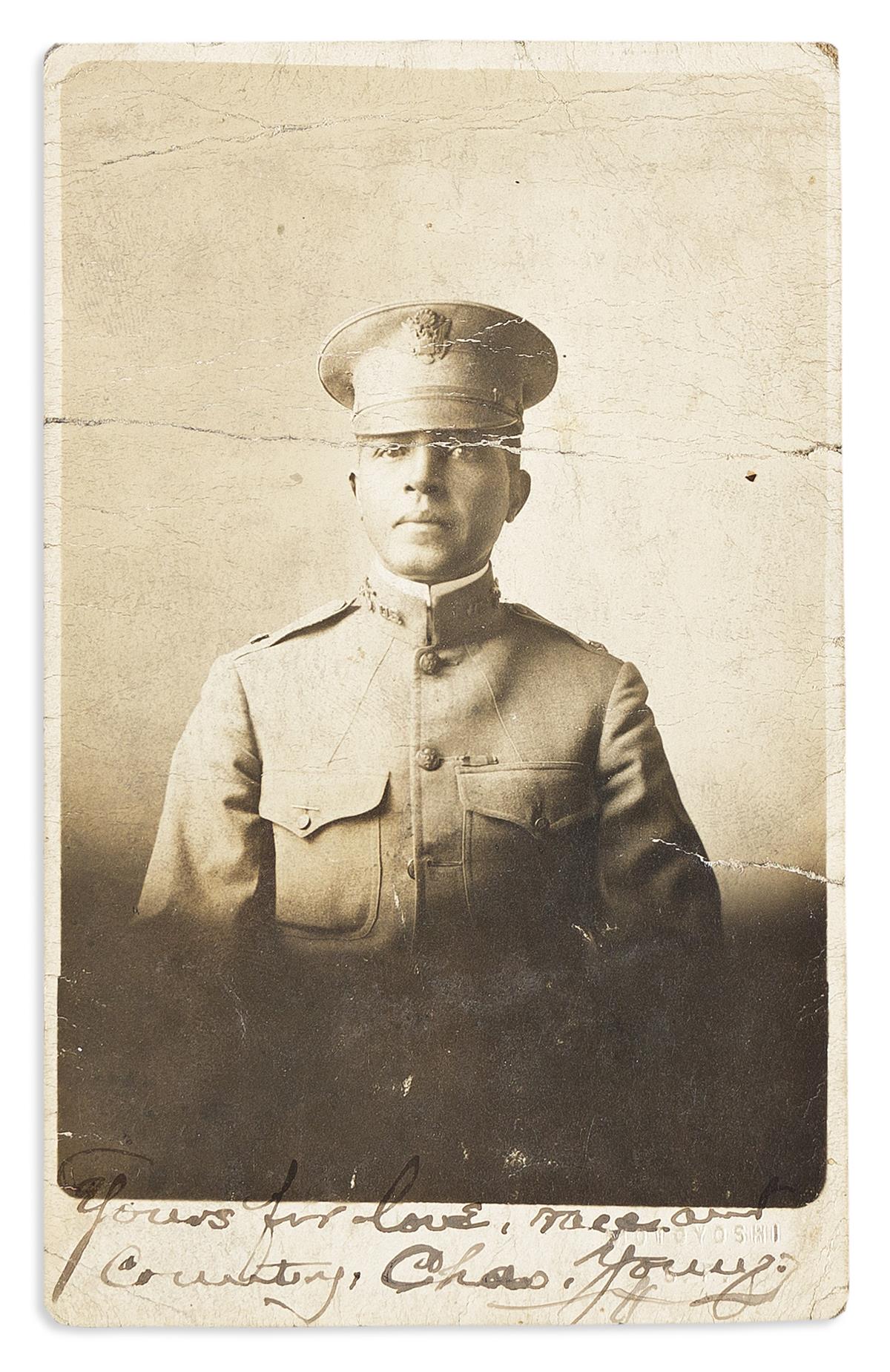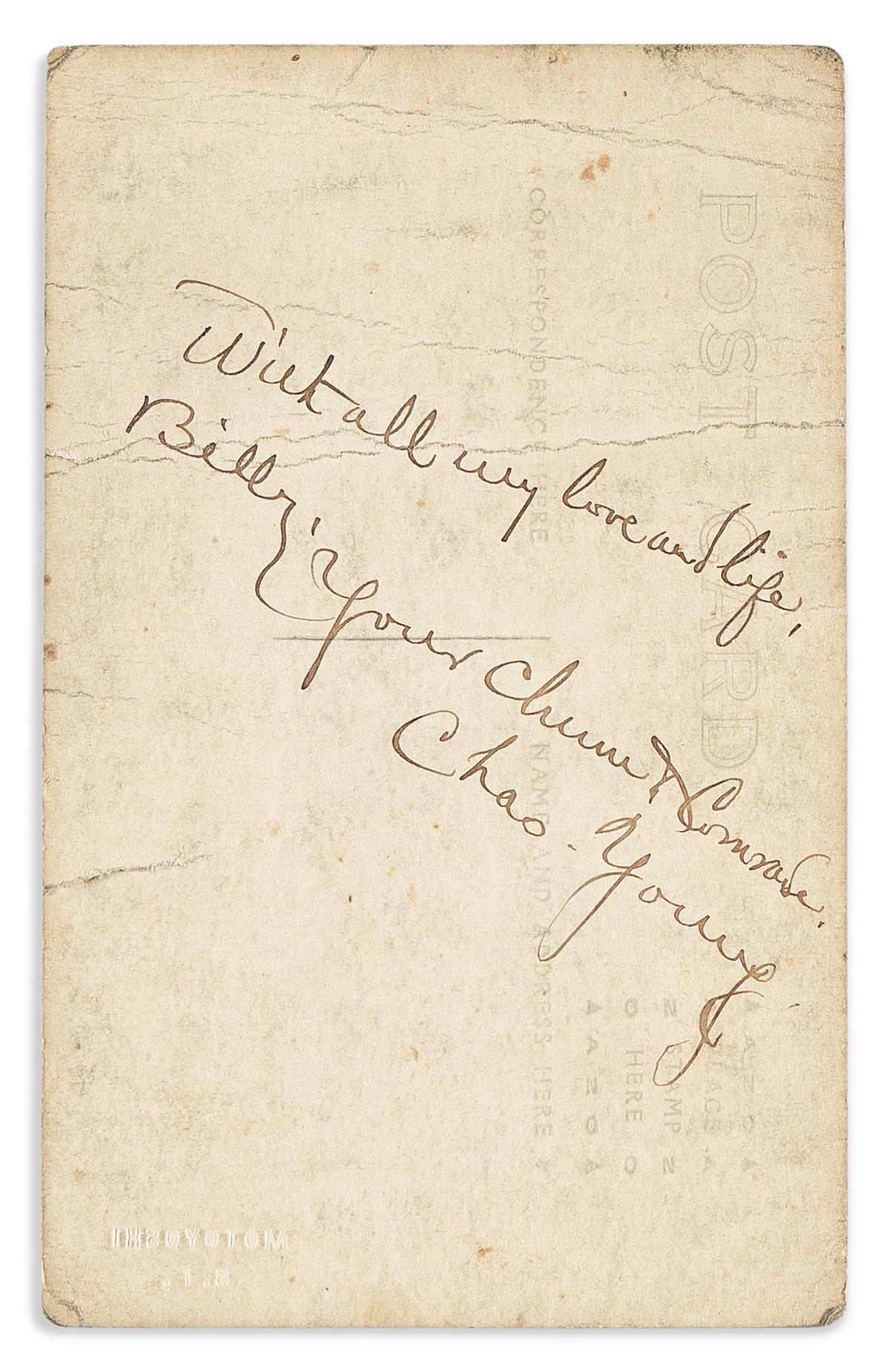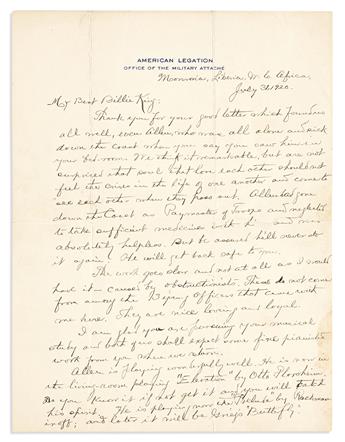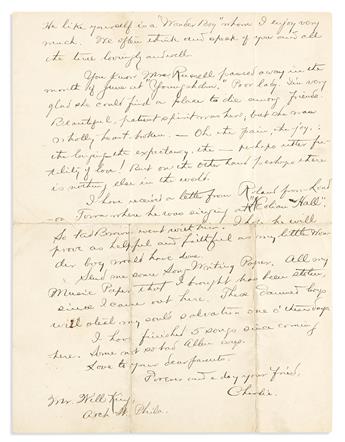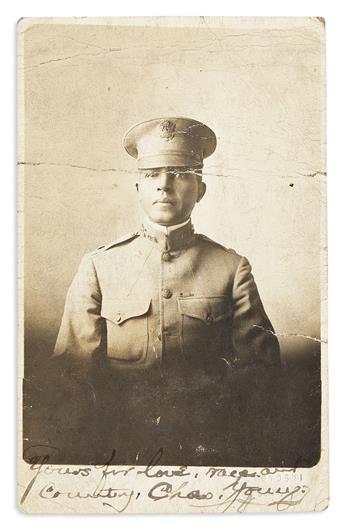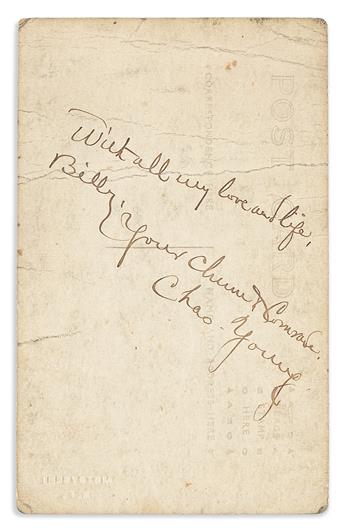Sale 2631 - Lot 259
Price Realized: $ 1,100
Price Realized: $ 1,375
?Final Price Realized includes Buyer’s Premium added to Hammer Price
Estimate: $ 2,000 - $ 3,000
(MILITARY.) Charles Young. Warm personal letter and signed photo postcard by America's first Black colonel. Autograph Letter Signed as "Charlie" on the letterhead of the "American Legation, Office of the Military Attaché," to William "Billie" King of Arch Street, Philadelphia. 2 pages on one sheet, 10 x 8 inches; partial closed tear along one fold, light finger-soiling. With undated Real Photo Postcard by Motoyoshi of San Francisco, 5 1/4 x 3 1/4 inches, depicting Young in uniform, signed and inscribed by Young on both sides; worn with several folds. Monrovia, Liberia, 31 July 1920
Additional Details
"Yours for love, race, and country"
Charles Young (1864-1922) had a storied Army career: third Black graduate of West Point, rose through the ranks with the Buffalo Soldiers, commanded a regiment of Black troops during the Spanish-American War, appointed the United States military attaché to Liberia in 1912, led a squadron in the fight against Pancho Villa in 1916, and became the first Black colonel in the army later that year. He returned to Liberia as military attaché in 1919, and died on duty in Africa in 1922. He received a posthumous honorary promotion to the rank of Brigadier General in 2022.
This letter shows Young's personal side. Colonel Young was a talented amateur musician. This letter was written to William Leonard King (born 1894), a young Philadelphia pianist who was Marian Anderson's regular accompanist. King was a military veteran, and we suspect he had served under Young at some point, where they discovered a shared love of music. The letter's main subject is not military business--Young mainly discusses music and their mutual friend Lieutenant Allen Clyde Bean (born 1896), a young Black officer who was serving under Young in Liberia: "I am glad you are pursuing your musical study and both of us shall expect some fine pianistic work from you when we return. Allen is playing wonderfully well. He is now in the living room playing 'Elevation' by Otto Florsheim. Do you know it? If not, get it, and you will catch his spirit. He is playing now the 'Prelude' by Rachmaninoff; and later it will be Grieg's 'Butterfly.' He like yourself is a 'wonder boy' whom I enjoy very much. We often think and speak of you, and all the time lovingly and well. . . . Send me some song-writing paper. All my music paper that I brought has been stolen since I came out here. These damned boys will steal my soul's salvation one o' these days. I have finished 5 songs since coming here. Some not so bad, Allen says." He continues with a discussion of famed Black tenor Roland Hayes and his accompanist Lawrence Brown: "I have received a letter from Roland from London town, where he was singing at Aeolian Hall, so Kid Brown went with him. I hope he will prove as helpful and faithful as my little wonder boy would have done."
Young also discusses his life in Liberia, particularly their mutual friend: "Allen . . . was all alone and sick down the coast when you say you saw him in your bedroom. We think it remarkable, but are not surprised that souls that love each other should not feel the crises in the life of one another and come to see each other when they pass out. Allen had gone down the coast as paymaster of troops, and neglected to take sufficient medicines with him, and was absolutely helpless. But be assured he'll never do it again. He will get back safe to you." Allen was one of three Black officers who accompanied Young to Liberia: "The work goes slow and not at all as I would have it--caused by obstructionists. These do not come from among the 3 young officers that came with me here. They are nice, loving, and loyal."
The accompanying postcard is signed and inscribed by on recto "Yours for love, race, and country, Chas. Young" and on verso "With all my love and life, Billy, your chum & comrade, Chas. Young." The National Archives holds another example of the image.
Provenance: found among the papers of noted pianist Lawrence Brown (1893-1972), who is mentioned in the letter as a mutual acquaintance (see lot 206). Brown kept the postcard framed in his home. We have not traced any other Colonel Young autographs at auction--and certainly none so personal or interesting.
Charles Young (1864-1922) had a storied Army career: third Black graduate of West Point, rose through the ranks with the Buffalo Soldiers, commanded a regiment of Black troops during the Spanish-American War, appointed the United States military attaché to Liberia in 1912, led a squadron in the fight against Pancho Villa in 1916, and became the first Black colonel in the army later that year. He returned to Liberia as military attaché in 1919, and died on duty in Africa in 1922. He received a posthumous honorary promotion to the rank of Brigadier General in 2022.
This letter shows Young's personal side. Colonel Young was a talented amateur musician. This letter was written to William Leonard King (born 1894), a young Philadelphia pianist who was Marian Anderson's regular accompanist. King was a military veteran, and we suspect he had served under Young at some point, where they discovered a shared love of music. The letter's main subject is not military business--Young mainly discusses music and their mutual friend Lieutenant Allen Clyde Bean (born 1896), a young Black officer who was serving under Young in Liberia: "I am glad you are pursuing your musical study and both of us shall expect some fine pianistic work from you when we return. Allen is playing wonderfully well. He is now in the living room playing 'Elevation' by Otto Florsheim. Do you know it? If not, get it, and you will catch his spirit. He is playing now the 'Prelude' by Rachmaninoff; and later it will be Grieg's 'Butterfly.' He like yourself is a 'wonder boy' whom I enjoy very much. We often think and speak of you, and all the time lovingly and well. . . . Send me some song-writing paper. All my music paper that I brought has been stolen since I came out here. These damned boys will steal my soul's salvation one o' these days. I have finished 5 songs since coming here. Some not so bad, Allen says." He continues with a discussion of famed Black tenor Roland Hayes and his accompanist Lawrence Brown: "I have received a letter from Roland from London town, where he was singing at Aeolian Hall, so Kid Brown went with him. I hope he will prove as helpful and faithful as my little wonder boy would have done."
Young also discusses his life in Liberia, particularly their mutual friend: "Allen . . . was all alone and sick down the coast when you say you saw him in your bedroom. We think it remarkable, but are not surprised that souls that love each other should not feel the crises in the life of one another and come to see each other when they pass out. Allen had gone down the coast as paymaster of troops, and neglected to take sufficient medicines with him, and was absolutely helpless. But be assured he'll never do it again. He will get back safe to you." Allen was one of three Black officers who accompanied Young to Liberia: "The work goes slow and not at all as I would have it--caused by obstructionists. These do not come from among the 3 young officers that came with me here. They are nice, loving, and loyal."
The accompanying postcard is signed and inscribed by on recto "Yours for love, race, and country, Chas. Young" and on verso "With all my love and life, Billy, your chum & comrade, Chas. Young." The National Archives holds another example of the image.
Provenance: found among the papers of noted pianist Lawrence Brown (1893-1972), who is mentioned in the letter as a mutual acquaintance (see lot 206). Brown kept the postcard framed in his home. We have not traced any other Colonel Young autographs at auction--and certainly none so personal or interesting.
Exhibition Hours
Exhibition Hours
Aliquam vulputate ornare congue. Vestibulum maximus, libero in placerat faucibus, risus nisl molestie massa, ut maximus metus lectus vel lorem.



